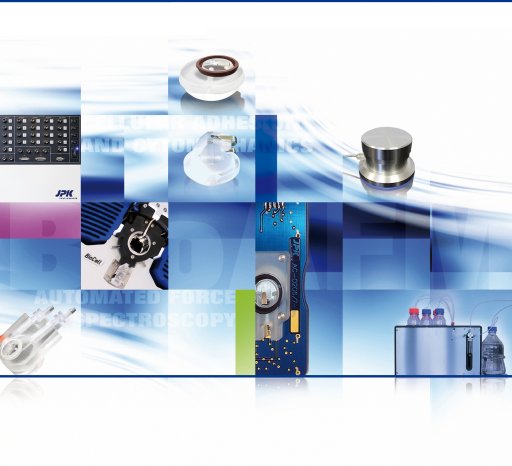JPK's philosophy in the development of their instrumentation range has been to provide unlimited possibilities to their users. Working in scanning probe microscopy (SPM), a researcher may start with a basic system such as an atomic force microscope. Perhaps they would then add from a menu of operation modes to enable the study of specific sample properties, e.g. mechanical, electrical or electrochemical. JPK has a central platform known as the NanoWizard® AFM. Their BioAFM head is now complemented by optional heads such as the CellHesion® 200 and ForceRobot® 300.
The important question is how is this beneficial to users? More and more laboratories are sharing instrumentation not just between individual research groups but also between scientific disciplines. For example, environmental control of the sample is now accepted as vital to obtain reproducible images and to study how reactions may vary depending on variables such as humidity, liquid/gas composition or temperature.
This is illustrated by the research work of Dr Kay-Eberhard Gottschalk. Dr Gottschalk received his PhD at the Technical University in Munich in the group of Professor Horst Kessler. After a postdoc at the Weizmann Institute focusing on protein-protein interactions with Gideon Schreiber, he became a junior group leader at the Department of Applied Physics, headed by Hermann Gaub at the Ludwig Maximilians University in Munich. He has recently become leader of the new nanostructure research group at the University of Greifswald within the Centre of Humoral Immune Reactions in Cardiovascular Disease (ZIK HIKE), sponsored by the German Federal Ministry of Science under their innovation initiative "Unternehmen Region". Dr Gottschalk's research work started with theoretical structural biology, but he later expanded his research by force measurements, a subject about which he has published a number of papers reporting on single molecule force spectroscopy on living cells and interactions between proteins or cells and surfaces.
Speaking about JPK's range of SPM accessories approach, Dr Gottschalk said "the research of my lab is at the interface of medicine and physics. Our collaboration partners are physicians, which report on immune reactions after treatment with certain medications. They want to know the molecular reasons. To answer their questions, I need instruments that offer me the powerful opportunity to combine very sensitive measurements of protein interactions on cells with cutting edge microscopic approaches. The unique design of the JPK instruments allows me to integrate the insight gained by life-cell microscopy with the measurement of adhesive forces down to the single molecule level, even when working with samples from patients. This will push our understanding of the immune response to bio-therapeutics to a new level."
JPK develops, engineers and manufactures instrumentation in Germany to the world-recognised standards of German precision engineering, quality and functionality. For further details of the NanoWizard®3 and its many applications, please visit the JPK web site, www.jpk.com. The new 2010 Accessories Handbook may be downloaded as a PDF.

